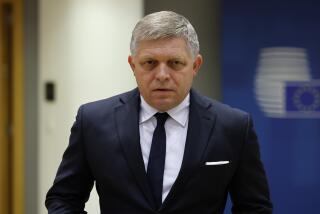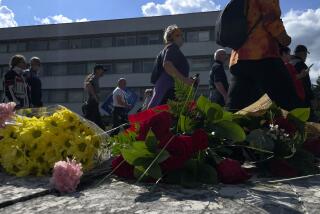Scores Held in Killing of Serb Leader
- Share via
BELGRADE, Serbia and Montenegro — A day after Serbian Prime Minister Zoran Djindjic was gunned down, the government announced Thursday that it had arrested or detained nearly 60 people in connection with the assassination, including two men believed to have been involved in some of the worst atrocities of the Balkan civil wars.
At the same time, acting Prime Minister Nebojsa Covic told this strife-weary republic that a successor to Djindjic will be nominated Sunday, in an attempt to maintain as much stability as possible during the uncertain period ahead.
After a day of intensive manhunts under a government-declared state of emergency, police said 56 people had been arrested on suspicion of conspiring in Wednesday’s daring sharpshooter ambush on Djindjic, who was shot as he walked into his office building.
Many of those arrested belonged to an organized crime ring, the Zemun clan, which Djindjic had planned to target in a crackdown, authorities said. But the gunmen and the gang’s key leaders remained at large.
More significant was the revelation Thursday night that two other men -- Franko Simatovic and Jovica Stanisic -- had also been detained, strengthening suggestions that Djindjic’s killing was not linked solely to the mafia crackdown but also wrapped up in this country’s bloody political past.
Stanisic was former Yugoslav President Slobodan Milosevic’s secret police chief, and Simatovic founded the notorious special operations unit known as the Red Berets.
Some observers say Djindjic was killed by snipers partly because former members of Serbia’s nationalist paramilitary groups feared that he would turn them over to the war crimes tribunal at The Hague, where they would be following in the footsteps of the ousted Milosevic.
The Red Berets are believed to have committed massacres of Muslims in Bosnia-Herzegovina and ethnic Albanians in the Serbian province of Kosovo on orders from the very top as part of a state-sanctioned campaign of “ethnic cleansing.” Many former Red Berets are now members of the Zemun clan, and some are rumored to be under sealed indictment by The Hague.
Covic, who is also a deputy prime minister, acknowledged that the “constant pressure” on Belgrade to cooperate with the war crimes tribunal could have been a factor in Djindjic’s killing.
“We, of course, know that should be done,” he said in a television interview, “but if one puts too much emphasis on these kinds of things, then you get counterproductive effects.”
It was not immediately clear whether Simatovic and Stanisic would remain in custody -- a potentially enormous victory for human rights campaigners -- or be released.
Serbian Interior Minister Dusan Mihajlovic vowed that anyone who had a hand in Djindjic’s assassination would be arrested. The police were ready to “liquidate anyone who offers resistance,” he warned.
Officers toting Kalashnikovs stood watch outside state offices Thursday on a day of bitter cold and somber mood. The streets of this normally busy capital were subdued, with far fewer cars on the road than usual.
But the armed guards and chilly wind did not deter the hundreds of residents who came to pay respects to their fallen prime minister, a man who many felt stood a chance of restoring some normality and bringing reform to their strife-torn republic.
“He was trying to lead Serbs into Europe, into true democracy,” Ljubica Danicic, 76, said as mourners laid flowers and lighted candles near the ambush site. A block-long queue of people waited to sign a memorial book inside the central government building.
Although criticized by some as a sometimes Machiavellian politician who swayed with the wind, Djindjic was “a son of Serbia,” Danicic said, “a democrat in heart and soul.”
His government advocated economic and political reforms to push Serbia and Montenegro -- a loose union of the two members of the former rump Yugoslavia -- out of the shadow of its Communist and war-ravaged past.
But those reforms put him at odds with Belgrade’s underworld, a collection of ruthless mobs that deal in narcotics, kidnappings and contract killings. As former paramilitary members whom Milosevic rewarded with their own turf for services rendered, many felt threatened by the pressure Djindjic had come under from the West to hand over war crimes suspects.
Simatovic’s name has come up often during Milosevic’s ongoing trial at The Hague, leading some to believe that he is one of the court’s wanted men.
Another frequently mentioned name is Milorad Lukovic, better known as “Legija,” an infamous strongman who succeeded Simatovic as chief of the Red Berets. Legija is one of the alleged leaders of the Zemun clan and is also wanted in connection with Djindjic’s assassination.
Fear of being turned in may have been compounded by a sense of betrayal. On the eve of the October 2000 protests that brought down Milosevic, Djin- djic cut deals with special police units such as the Red Berets to persuade them not to protect the beleaguered president. And after Milosevic’s ouster, Djindjic publicly declared that he wouldn’t send anyone to The Hague solely because the person had been in charge of units that committed atrocities.
His recent moves to comply with The Hague’s demands therefore stirred alarm among those who had thought him an ally.
Worried that the country might now be on the verge of a violent showdown with former paramilitary members and their gangs, Covic warned that the army was ready to defend the government if rogue forces threatened it.
“We are in great danger of losing power and slipping into anarchy if something like that happens,” he said. “We have to use decisive measures to stop that without any compromise.”
He added: “We have to find out who rules in this country: mafia and those who kill the prime minister and [other] people, or those who were democratically elected.”
On Sunday, the chief committee of Djindjic’s party will convene to nominate a new prime minister, probably Zoran Zivkovic, a former Yugoslav interior minister. But whether Zivkovic will be able to keep together the 17-party coalition that Djindjic presided over by force of personality remains to be seen.
European Union officials flew to Belgrade, both the Serbian and the country’s capital, on Thursday to pledge their support of the reforms begun by Djindjic. “There can be no going back, no turning back,” said Chris Patten, the EU’s external affairs commissioner.
Milos Vasic, a respected military analyst with the newsmagazine Vreme, said the battle against organized crime and the former paramilitaries was now joined -- and must be seen through lest more tragedy befall.
“They’re facing a simple choice,” Vasic said. “Either they finish this story once and for all, or they are going to face another assassination.”
More to Read
Sign up for Essential California
The most important California stories and recommendations in your inbox every morning.
You may occasionally receive promotional content from the Los Angeles Times.














